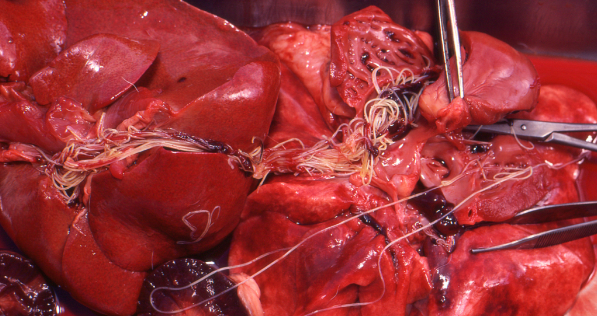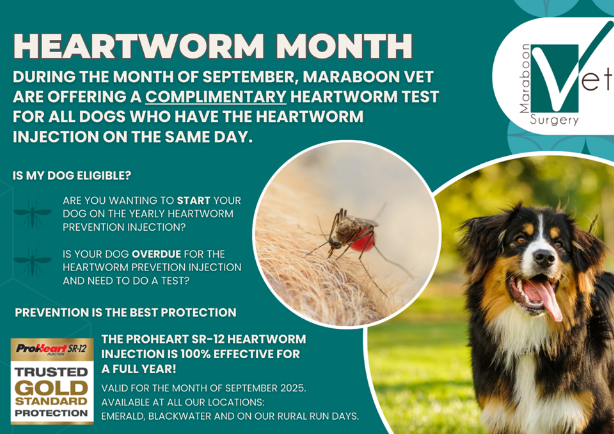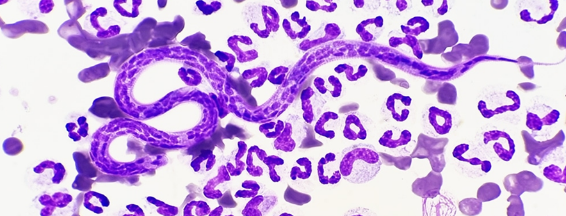Heartworm disease is a serious and potentially fatal condition caused by a parasitic worm (Dirofilaria immitis). Heartworm is exactly what it sounds like, a worm that lives in the heart (and lungs) of your pet. It is spread through the bite of an infected mosquito. Even indoor pets aren’t 100% safe, because we all know those pesky mozzies can sneak inside. Unfortunately the central highlands have no shortage of mozzies and we are finding it to be prominent in the surrounding areas.
The Heartworm worm (microfilaria) travels through the bloodstream until they make their way to the dog’s heart and lungs. Here, they attach to the muscle wall and grow into adult heartworms. Unfortunately heartworm causes irreversible damage to the heart and lungs of the dog and if they have a large burden, the organs can become overwhelmed with the work load and eventually go into organ failure.
 |
| Figure – Heartworms can grow to 35cm long and the heart can have hundreds of heartworms present! |
The Sneaky Signs
Here’s the tricky part: pets often don’t show signs of infection until the disease is advanced. Some warning signs in dogs include:
- Persistent cough
- exercise intolerant, getting tired quickly after
- Loss of appetite
- Loss of weight
- Heart failure
Prevention is Easy (and Affordable)
Option 1: Monthly Heartworm Tablets
- Always check product label to ensure it covers heartworm! Monthly tablets are effective as long as pet owners are compliant with administered these strictly every 28 days (once a month). If a pet owner is late giving a heartworm tablet, the dog can be at risk of transmitting heartworm disease.
Option 2: Yearly Heartworm Injection
- The yearly heartworm injection is administered by the veterinarian. This injection provides your dog 12 months of protection against microfilaria (the active ingredient in the injection kills the microfilaria that are added to the blood stream by mosquitos).
Good news! Prevention is far safer, easier, and more affordable than treating for Heartworm. It can be tough, both emotionally and financially, which is why early diagnosis and strict prevention is so important!
What to Do Next
- Check your pet’s prevention status: If they’re not on anything right now, book a quick vet visit for a heartworm test.
- Stay consistent: Missing even a month of prevention can put your pet at risk.
- Ask us: Our team at Maraboon Vet Clinic can help you choose the best option for your pet’s lifestyle.
Special Offer This Month
Take advantage of our heartworm promotion this month at Maraboon Vet Surgery! We are offering complimentary heartworm tests for dogs having their proheart injection on the same day. This is the perfect opportunity for dogs starting on proheart injection or dogs that have lapsed and need to be tested for heartworm.

Diagnosis and Treatment
If your pet is not currently on heartworm prevention, a simple blood test at the clinic can check for infection. Treatment for dogs with heartworm is possible but can be lengthy, costly, and carries risks. Since clinical signs may not appear until the disease is advanced, early detection is critical.

Figure – Microfilaria present under microscope
If your pet tests positive for heartworm on a routine screening test:
Step 1: Further diagnostic work is needed. This may include:
- Blood tests to confirm infection and assess overall health of organ function.
- Chest X-rays or ultrasound to evaluate the heart and lungs
These tests help your vet decide on the safest treatment plan.
Step 2: Stabilisation before Treatment
In advanced cases, your pet may need supportive care before heartworm treatment can begin. This might involve:
- Medications to reduce inflammation and improve heart function
- Antibiotics (such as doxycycline) to target bacteria associated with heartworms
- Exercise restriction to minimise stress on the heart and lungs
Step 3: The Treatment Protocol
Heartworm treatment is a staged process:
- Pre-treatment medication: Dogs are usually placed on heartworm prevention and given medications to kill immature worms and reduce complications.
- Immiticide injections: The main treatment involves injections to kill adult worms. This is administered in stages over several weeks.
- Strict rest: After injections, dogs must remain on strict exercise restriction for at least 6-8 weeks. When adult worms die, fragments can block blood vessels, and activity increases the risk of serious complications.
Protect Your Dog from Heartworm Disease
Dogs will be closely monitored throughout treatment, with follow-up tests performed several months later to ensure the infection has fully cleared. Your veterinarian will also recommend lifelong prevention to avoid reinfection and safeguard your dog’s health.
At Maraboon Vet Clinic, we provide:
- Reliable heartworm testing
- Customised treatment plans tailored to your pet’s needs
- Ongoing prevention strategies to keep your pet safe year-round
Your pets give you unconditional love, let’s return the favour by protecting them from heartworm.
Contact us on 07 4987 6800 or email us at admin@maraboonvet.com.au to book an appointment or ask us any questions about heartworm disease and prevention.
